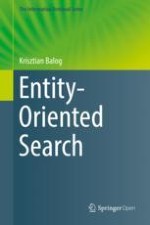Open Access 2018 | Open Access | Buch

Entity-Oriented Search
verfasst von: Krisztian Balog
Verlag: Springer International Publishing
Buchreihe : The Information Retrieval Series
Open Access 2018 | Open Access | Buch

verfasst von: Krisztian Balog
Verlag: Springer International Publishing
Buchreihe : The Information Retrieval Series
This open access book covers all facets of entity-oriented search—where “search” can be interpreted in the broadest sense of information access—from a unified point of view, and provides a coherent and comprehensive overview of the state of the art. It represents the first synthesis of research in this broad and rapidly developing area. Selected topics are discussed in-depth, the goal being to establish fundamental techniques and methods as a basis for future research and development. Additional topics are treated at a survey level only, containing numerous pointers to the relevant literature. A roadmap for future research, based on open issues and challenges identified along the way, rounds out the book.
The book is divided into three main parts, sandwiched between introductory and concluding chapters. The first two chapters introduce readers to the basic concepts, provide an overview of entity-oriented search tasks, and present the various types and sources of data that will be used throughout the book. Part I deals with the core task of entity ranking: given a textual query, possibly enriched with additional elements or structural hints, return a ranked list of entities. This core task is examined in a number of different variants, using both structured and unstructured data collections, and numerous query formulations. In turn, Part II is devoted to the role of entities in bridging unstructured and structured data. Part III explores how entities can enable search engines to understand the concepts, meaning, and intent behind the query that the user enters into the search box, and how they can provide rich and focused responses (as opposed to merely a list of documents)—a process known as semantic search. The final chapter concludes the book by discussing the limitations of current approaches, and suggesting directions for future research.
Researchers and graduate students are the primary target audience of this book. A general background in information retrieval is sufficient to follow the material, including an understanding of basic probability and statistics concepts as well as a basic knowledge of machine learning concepts and supervised learning algorithms.